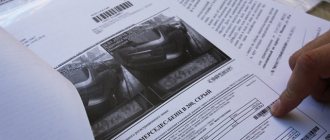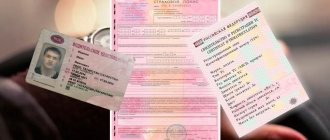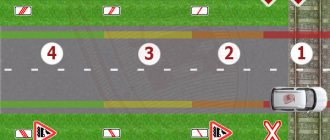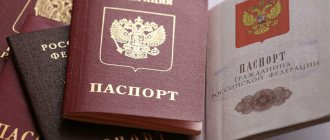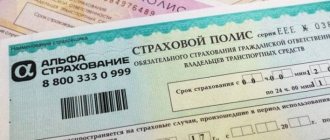Any citizen who gets behind the wheel of a car must comply with the Traffic Rules and other regulations governing the movement of vehicles, as well as their parking.
Parking on the lawn is one of the most controversial violations. Federal law does not establish penalties for this action. The legality of holding a car owner liable is determined based on local laws and regulations.
Normative base
Parking on the lawn is considered an administrative offense. The amount of the monetary penalty is established in accordance with the norms of the Code of Administrative Offenses of the Russian Federation. In particular, the fine is established in Article 12.19.
Attention! If you have any questions, you can chat for free with a lawyer at the bottom of the screen or call Moscow; Saint Petersburg; Free call for all of Russia.
Regional authorities have the right to adopt their own regulations if they do not contradict the norms of federal laws. The authorities of Moscow and St. Petersburg pay special attention to parking on the lawn. Fines in these cities are higher than in other settlements of the Russian Federation. The amount of penalties is regulated by:
- Law of the city of Moscow on the protection of green spaces of May 5, 1999. The regulation prohibits vehicles from entering or stopping on green areas.
- Article 4.18 of the Moscow City Code on Administrative Offences. Fixes the amount of monetary fines for damage to green spaces.
- Article 8.25 of the Moscow City Code on Administrative Offences. Determines the amount of penalties if a stop is made on the lawn of an area occupied by green spaces.
- Law of St. Petersburg No. 273.70 of May 31, 2010. Determines the amount of penalties for parking in green spaces.
When is the fine for parking on the lawn in 2021?
In 2021, a fine will be imposed if the driver leaves the vehicle on the lawn. The term is not specified in any federal legislative act. The only mention is in the traffic rules. The term is indicated together with the concept of Sidewalk. However, there is also no interpretation. When imposing a fine for parking on a lawn, representatives of the state traffic inspectorate rely on their own ideas about the word or a definition from a dictionary. Typically, the concept of lawn is understood as a well-groomed piece of land on which there is short-trimmed grass, ornamental or perennial plants. If a person stops at such a place, he will be held accountable.
It is recommended to rely on the legislation of the constituent entity of the Russian Federation. Thus, a clear definition of a lawn is given in the note to Article 32 of the Law of St. Petersburg No. 273-70. The concept refers to the surface of the Earth that does not have a hard covering with side stones or other material, and is also covered with vegetation of natural or artificial origin. The lawn is used for landscaping the area.
Local regulations do not always prohibit damage to land. In this situation, the penalty is issued simply for illegal parking.
Is it possible to challenge a fine?
A fine for driving on the lawn can be contested. It is possible to avoid liability for such parking in the following cases:
- discrepancies between the actual location of the lawn and the site plan approved by government agencies;
- the absence of any plantings in the area where the driver parked;
- if the road user stopped and did not park on the lawn, and he is charged with “parking”;
- if parking was necessary in an emergency, and the local area does not provide parking zones.
To get the fine cancelled, you need to pay attention to all the details of the parking lot and take into account how the car was parked in the lot, whether the area was covered with grass, how long the car was left, and so on. If possible, details should be captured in photos or videos and telephone numbers of witnesses should be collected.
Penalties for parking and parking on the lawn in 2021
For violations committed, the person will be held administratively liable. The amount of the penalty is determined by Article 12.19 of the Code of Administrative Offenses of the Russian Federation and regional regulations. The amount may vary depending on the region. In St. Petersburg and Moscow, the amount of the penalty is much larger than in other localities.
Regional legislation may contain its own enforcement measures if they do not contradict the provisions of federal regulations. Thus, in accordance with Article 8.25 of the administrative code of the city of Moscow, violators may be required to restore green spaces that were damaged as a result of the actions of the car owner. The measure is applied in addition to the fine.
Fines for parking on grass in 2021
The application of fines is drawn up in accordance with the norms of Article 12.19 of the Code of Administrative Offenses of the Russian Federation and regional legislative acts. The fine for parking on a lawn in 2021 varies from 500 to 5,000 rubles (the amount depends on the location of the offense). The concept of Lawn does not appear in the legal act. However, monetary penalties for violating parking or stopping rules are reflected here. The rules apply to persons who leave a vehicle on the lawn.
For residents of regions of the Russian Federation, a penalty of 500 rubles is provided in accordance with Article 12.19, paragraph 1 of the Code of Administrative Offenses of the Russian Federation. The authorized body may limit itself to a warning. More severe penalties are applied to residents of federal cities (Moscow; St. Petersburg). Penalties reach up to 5,000 rubles (Article 8.25 of the Moscow Administrative Code).
If a resident of the capital damages green spaces, Article 4.18 of the Moscow City Code on Administrative Offenses comes into force. The amount of the penalty for citizens increases to 4,000-4,500 rubles. If the violation was committed by an official, you will have to pay 50,000 rubles. A fine of up to RUB 300,000 may be applied to legal entities.
If a car is placed in Moscow on a lawn, near a children's playground, in accordance with Article 8.8 Part 3 of the Moscow Code, the fine will be:
- for citizens – 5000 rubles;
- for officials – 30,000 rubles;
- for legal entities – 300,000 rubles.
If the car is placed on a lawn or other territory in the city of Moscow occupied by green spaces, the punishment is established by Article 8.25 of the administrative code of the city of Moscow. The amount of penalties is as follows:
- for citizens – 3000-5000 rubles;
- for officials – 15,000-20,000 rubles;
- for legal entities – 100,000-200,000 rubles.
If the violation is committed in St. Petersburg, the fine is imposed in accordance with Law No. 273 -70, Article 32. The punishment will be as follows:
- for citizens – 3000-5000 rubles;
- for officials – 5,000-40,000 rubles;
- for legal entities – 150,000-500,000 rubles.
Who records damage to lawns and green spaces and how?
You can be caught violating parking rules in Moscow:
- mobile systems for recording violations of parking rules;
- foot inspectors of the Moscow Administrative Road Inspectorate (MADI);
- any citizen through a special application on a smartphone.
Mobile complexes for recording violations of parking rules are cameras in the cars of the Traffic Management Center, which ply along their own routes. They photograph license plates of cars that violate any stopping and parking rules.
MADI foot inspectors record violations of parking rules using tablets - portable photo and video recording systems. They take two photographs: a general shot showing the entire car and the violation, and a close-up of the license plate. Photos are automatically sent to a single dispatch center indicating the time and location of shooting. If the area where the car is parked in the photo is included in the Moscow City Register of Green Spaces, then the owner of the car will receive a fine for parking in the “green” zone.
An online map with prohibited parking zones is also available in the Moscow Assistant application. Using it, car owners can check whether it is safe to park in a particular area. To do this, you need to enable the “Fixation zones near me” mode in the application. If the car is outside the prohibited area, it will not be possible to photograph it.
Any Moscow resident can take photos and videos of parking violations on their smartphone and send them directly to the mayor’s office. For example, through the Moscow Assistant mobile application. After reviewing the materials at the mayor's office, the car owner may receive a fine from MADI. Muscovites eagerly take advantage of this opportunity, because for activity in the application you can get points, and then exchange them for free travel, theater tickets and other gifts.
Check lawn fines in Moscow
Who is allowed to park on the lawn in 2021?
The legislation does not contain a clear list of situations in which parking on the lawn is permissible in 2021. You can defend your rights and avoid monetary penalties in the following situations:
- The site does not fall under the definition of a lawn and is not recognized by it from a legal point of view. A traffic police representative cannot impose a fine on a citizen for parking on a lawn. However, residents of the house have the right to initiate legal proceedings and recognize the local area as a lawn.
- There is a permit provided by the traffic police. The document is issued extremely rarely. However, his presence frees the citizen from monetary penalties. Based on the paper, it will be possible to challenge the fine if it was issued.
- There is no harm to green spaces. By 2021, a modern eco-lawn has already been developed. It is resistant to damage caused by car wheels. However, such sites are still present only in large populated areas.
- Parking sign installed. It lifts the ban on leaving a car on the lawn.
- The shutdown was carried out in winter. Under a layer of snow, it is difficult to understand whether there is a lawn or whether there is open ground under the wheels of a car. However, the legislation does not provide direct permission to enter the lawn during the cold season. The only exceptions are the regulations of several cities of the Russian Federation.
In all other cases, parking on the lawn is considered illegal. An employee of the State Traffic Inspectorate has the right to draw up a protocol, hold the driver accountable and issue a fine for parking on the lawn.
A person may be called to a commission. The local administration is looking into the situation. If a citizen argues for an action, instead of a fine for parking on the lawn, a reprimand may be applied. If a person does not appear at the meeting, challenging the commission’s decision will be problematic.
To which authority can a complaint be filed?
To appeal the imposed penalty, the driver found guilty can contact:
- to the official whose subordinate drew up the resolution;
- to court.
When contacting a higher official, it is necessary to draw up a complaint, which should reflect:
- full name, address, passport details of the applicant;
- facts of the event;
- details of the person who compiled the protocol;
- details (date and number) of the document by which the driver is held accountable;
- grounds for canceling the imposed fine;
- date and signature of the applicant.
You can appeal the order either during a personal appearance before the head of the traffic police (head of administration), or by sending an application by post.
In parallel with challenging the fine in a government agency, you can initiate a judicial procedure for considering objections.
If the amount of the fine is less than 50 thousand rubles, the complaint is filed in the magistrate’s court, if more - in the district courts at the place of residence of the applicant. When filing a complaint against civil servants, you do not have to pay a court fee.
If the protest to the official does not seem to be effective to the citizen, the complaint can be immediately filed in court.
Camera fine for parking on the lawn
In a classic situation, a violation of the rules is recorded by a traffic police inspector. He hands the driver a fine. This is a standard sheet on which the number is indicated and there is a link to the legal act that was violated. Additionally, information about the car, the amount of the monetary penalty and the date of the incident are recorded.
In the capital, control over compliance with parking rules is carried out by inspectors from MADI and the State Institution of the Autonomous Republic of Belarus. Pedestrians in nearby yards report illegal parking.
If the inspector is not nearby, the violation may be recorded by surveillance cameras. They are installed in crowded places. The video is being processed by representatives of the State Traffic Inspectorate. Within 3 days, the person will be sent a letter with a fine for parking on the lawn. Additionally, photo evidence of guilt is attached. The photo must clearly show the license plates of the vehicle and the fact of hitting the lawn.
If a person does not agree with the imposed punishment, an appeal is permissible. If the violation is recorded by cameras, you need to contact the institution that imposed the punishment.
On what grounds can it be cancelled?
Since the argumentation in challenging is crucial, every driver should know the most common grounds for appealing fines.
Is this a lawn or not?
In both federal and regional legislation, there is a strong gap in the regulation of the key concept of the entire procedure - the lawn. In practice, there is no precise and uniform definition of this concept, which already opens up the possibility for drivers to challenge regulations on the basis that parking was not carried out on lawns.
For example,
- in Moscow, a lawn is a plot of land on which green spaces can be placed,
- in Tver, this term means vegetation cover,
- and in Yekaterinburg, a lawn is an area that is adjacent to other surfaces.
In other words, you can already see an obvious difference in terminology. In Moscow, the lawn does not have to be filled with vegetation, but in Tver it is required.
The driver’s task is to prove that in his case the parking area was not a lawn. This can be done either using official terminology or through special schemes. At the same time, it is advisable to bring to court or the traffic police photographs of the plot of land where your car was parked at the time the penalty was imposed.
However, large cities have long had “lawn maps”, which can be used to determine in advance whether a particular area is prohibited for parking. For example, in Moscow, the Moscow Assistant application has a function for viewing green areas online.
No grass grows here
This basis partially follows from the previous one. A lawn is not necessarily an area with green spaces, which is something every driver should remember. Regional norms play a special role. For example, in Tver, for example, a lawn by definition is a grassy area, and if the driver stopped where there was no obvious vegetation, then the probability of successfully appealing the fine is quite high.
If you parked in the snow
In winter, it is sometimes not possible to determine whether a particular area of the territory is a lawn. Snowdrifts can hide not only the vegetation itself, but also fences. In this case, it is possible to justify the position that the driver simply did not understand that he was parking on the lawn because of the snow.
But there are some subtleties here, which are noted in the judicial practice of 2021 - the courts proceed from the fact that the driver is obliged to initially understand where he is parking. In the case of parking in the snow, it is best to find out the specific coordinates of the vehicle’s location and compare them with the “green scheme” map.
Thus, in this case, the news for those challenging the fine is not the best - very often the courts and officials considering the complaint do not satisfy it only on the grounds that supposedly there was no grass in this place, and the car stood on the snow.
The photo is not my car
This basis is especially relevant due to the introduction of various tracking and recording programs (for example, the same Moscow Assistant). Sometimes technical means malfunction and fines are assigned by mistake, sometimes the license plate number of a car is confused.
And here we already have good news for you. In such a situation, the easiest way to prove your own innocence is to simply present documents for the vehicle with information about the car (make, license plate number) and compare the information with the data of the technical equipment.
Another driver parked, not me
As a general rule, the driver, not the owner of the car, is responsible for illegal parking. However, this rule has one, but extremely unpleasant exception: if the violation was recorded by technical means that work automatically, then the owner is held accountable - that is, in this case the presumption of innocence no longer works.
To avoid this, it is necessary to prove that another person was driving the vehicle. And this very other person must actually take the blame. This could be a compulsory motor liability insurance policy with another driver listed, witness testimony or a certificate from the place of work (to prove that the owner was at work at the time of the violation).
Something else useful for you:
- How to appeal a speed camera ticket? Complaint form, procedure, deadlines
- How to appeal (challenge) a traffic police fine?
- The traffic police officer charges a violation, but I disagree - should he draw up a report and not issue a fine?
Forced stop
If the driver proves that he made a forced stop, he can get off with a simple warning. But for this it is necessary to perform all the actions that are required during a forced stop, and not just turn on the emergency lights, namely:
- display an emergency stop sign;
- turn on the hazard warning lights;
- try to push the car into the permitted parking area.
In practice in 2021, it will be extremely difficult to prove the fact of a forced stop. It’s just that not every judge will believe this for the simple reason that all drivers try to appeal a lawn ticket on this basis. But this does not negate its potential.
Repeated fines
If a driver stops on the lawn and does not drive for a long time, then a whole bunch of fines may be imposed against him. In fact, this would be a direct violation of one of the most important principles of justice: not to punish for the same violation twice.
However, you will have to prove on your own that there were no repeated parkings. This can be done, for example, by requesting data on the geolocation of transport in MADI.
Fine for parking on the lawn in the yard
Parking a vehicle on a lawn causes damage to the grass surface. As a result, the appearance of the landscape deteriorates. Grass stuck to car wheels pollutes asphalt areas. Sometimes lumps of dirt are carried along with it, which fall off in layers onto the asphalt. They are compacted by passing cars.
Parking on lawns in courtyards is prohibited in 2021. Standard penalties are applied to the violator. The citizen will be fined. Its size varies from 500 to 5000 rubles. depending on the region. Sometimes the person is additionally required to restore the damaged lawn.
Representatives of authorized bodies monitor compliance with the rules in the yards. There may be no cameras here. Inspectors visit the local area less frequently than central streets. However, the residents themselves can take action against the offender. If such a stop causes outrage and dissatisfaction, you can file a complaint. In 2021, the following may be considered:
- district engineering service;
- management companies;
- a special commission monitoring changes in penalties for illegal parking;
- representatives of district police departments.
Institutions may vary by region. First of all, it is recommended to contact the car owner and ask if there is a solution for stopping on the lawn. If a person refuses to perform an action, filing a complaint is permissible.
Fines for parking on the lawn in winter
In winter, it is more difficult to figure out where the lawn ends. In most regions of the Russian Federation there is no grass. However, this does not always give the right to stop on the lawn. It all depends on the current legislation. If the regional administrative code provides for monetary penalties, the rule will apply in winter, regardless of whether the area is covered with snow or not. The size of the fine remains exactly the same as in the summer period from 500 to 5000 rubles depending on the region. However, if local regulations reflect a list of exceptions that imply the possibility of stopping on the lawn in winter, they will not be able to impose penalties for illegal parking.
Fine for parking on a lawn in Moscow
Article 12.19 of the Code of Administrative Offenses of the Russian Federation establishes only the general amount of penalties that can be imposed on a violator for illegal parking. However, there are no provisions regarding stopping on the lawn. Moscow has adopted its own city code of administrative offenses. Here, Article 8.25 reflects penalties for citizens, officials and legal entities:
- Regular drivers are required to pay 5,000 rubles.
- For officials, the amount of the penalty is 30,000 rubles.
- If the violation was committed by an organization, it will be charged 300,000 rubles.
Fine for parking on a lawn in St. Petersburg
St. Petersburg has also adopted its own legal act. This is law number 273-70 of May 31, 2010. Penalties for parking and parking on the lawn are fixed here. The amount of the fine is reflected in Article 32. Ordinary citizens who commit a violation must pay 3,000-5,000 rubles. For officials, the figure increases and amounts to 5,000-40,000 rubles. If the violation was committed by a legal organization, the amount of the penalty reaches 150,000-500,000 rubles.
Exceptions apply. If damage to green spaces was caused by a vehicle involved in maintenance work, planting or repairs, no penalty will be imposed.
Towing a car for parking on the lawn
The process of evacuation of a vehicle is regulated by Article 27.13 of the Code of Administrative Offenses of the Russian Federation. It says that the car can be seized for non-compliance with the requirements prescribed by road signs prohibiting stopping or parking of vehicles. When it comes to parking on lawns, the car does not interfere with the movement of other vehicles. The corresponding signs are also usually missing. Therefore, forced evacuation of a car for parking on the lawn is unacceptable. This kind of action is considered illegal.
When faced with something like this, you need to defend your rights. It is recommended to do the following:
- Find out who gave the illegal order to place the car in the impound lot.
- Prepare a complaint. It is sent to the prosecutor's office or court.
- Challenge the requirement to pay the costs of towing the car and storing it in the impound lot.
Parking rules
The traffic rules stipulate that vehicles can be parked:
- on the sides or edges of the roadway;
- in specially designated areas marked with the appropriate symbol;
- on marked areas near buildings and structures.
It is strictly forbidden to abandon the car:
- on a highway or highway;
- closer than 50 meters from the railway crossing;
- in areas that block visibility (at the exit from courtyards, near pedestrian crossings, near turns);
- on bridges, overpasses and tunnels.
These rules apply to standard situations. In emergency cases, you can stop the car even in prohibited places, but only with the use of emergency signals and only if the safety of other road users is ensured.
How to deal with violators
You can often observe situations where cars are placed directly on areas and sites planted as parks, which destroys the soil and plantings.
To prevent the lawn from subsiding under the wheels of cars, special warning signs are installed in yards about the inadmissibility of leaving a car on a grassy surface. Also, the area prohibited from parking can be fenced off with metal barriers in the form of fences, which will prevent access to the sidewalks.
To punish careless drivers, video surveillance equipment can be installed in yards, which will record the license plates of violators. You can also take a photograph of the car on the lawn, and the fact itself can be stated in a complaint, which will be signed by several neighbors. Such statements, accompanied by photographic materials, can be sent to the head of the traffic police or to the district administration, whose powers include holding transport owners accountable.
Payment
A monetary penalty is imposed by the traffic police, MADI or other authorized bodies. Periodically, raids are carried out in courtyard areas to identify violators. The driver learns about the monetary penalty after it has been applied.
A fine for parking on a lawn in 2021 can be challenged. However, proving innocence is problematic. If a citizen admits his guilt, it is recommended to carry out the procedure for paying a fine for parking on a lawn as quickly as possible. For the convenience of citizens, several payment methods have been developed:
- while visiting a bank that accepts payment of fines;
- using ATMs or terminals;
- through the bank’s online system;
- using electronic wallets;
- by contacting the traffic police.
It is acceptable to use the State Services portal. The system makes it possible to make payments with minimal time expenditure. However, the option is available only to registered users. When a person has acquired an account in the public service system, he will be able to receive notifications about fines and tax debts. The process of depositing funds through the portal is carried out according to the following scheme:
- The citizen completes the authorization procedure, then clicks on the traffic police fines section.
- The presence of monetary penalties is checked. If they are available, you need to click on the pay button.
- Then you have to choose a payment method. Closing of obligations is carried out using the non-cash method. No commission is charged. Money arrives almost instantly.
- If required, printing a receipt is acceptable.
Discount on fines for parking on the lawn
Federal Law No. 437 of December 22, 2014 On amendments to the Code of Administrative Offenses of the Russian Federation in Article 32.2, paragraph 1.3, established the ability to pay fines with a 50% discount. The discount on paying fines for parking on the lawn in 2021 also applies. Payment must be made 20 days from the date of the decision. The date is recorded in the upper left corner of the document. It is not recommended to wait until the last few days. Transferring funds usually takes several days.
If the payment was made within 21 days, the fine for parking on the lawn will have to be paid in full.
What should I do if I received a fine for parking on the lawn by mistake?
In practice, a fine for parking on a lawn may be issued erroneously. If a person is sure that he did not violate, and monetary penalties are listed in the database, in 2021 the following actions must be taken:
- Familiarize yourself with the features of the protocol. If it is not true, you can safely move on to the next step. When a fine is issued using a camera, the protocol is always supplemented with a photograph. If it shows a photo of another car, then in this case it will be much easier to prove that the citizen did not violate the rules.
- Contact the traffic police. Here you can find out the origin of the fine. Often the error occurs due to incorrect data entry into the database. If this fact becomes clear, the penalty may be lifted within a few days. Data about him will simply be removed from the database.
- If representatives of the authorized body refuse to carry out the procedure and do not want to admit that the imposition of punishment was erroneous, it is recommended to begin the appeal procedure.
If the boundaries are not defined?
Before deciding on the legality or illegality of actions, it is necessary to define the concept of what a lawn is. According to the law, this is a grass cover for landscape design, on which the planting of shrubs, trees and flowers is allowed. The territory, as a rule, is enclosed by a curb or fence and adjacent to the sidewalk. In this case, parking on green grass is prohibited, and penalties will be imposed if violated. In winter, the boundaries of the grass are not visible under the snow, so from the point of view of the law, the territory is not a lawn. In this case, the fine does not apply to the driver of the parked car.
The territory may not be recognized as a lawn in the following cases:
- the flooring is made of hard modern plastic (artificial turf);
- if parking is temporarily permitted by a traffic police officer in connection with ongoing events;
- when the area in question is not, in fact, a lawn.
Appealing a fine for parking on the lawn
If a fine is imposed for parking on a lawn, the motorist can pay the fine or appeal the decision. The procedure must be initiated within 10 days from the date of receipt of a copy of the resolution. The rule is enshrined in Article 30.3 of the Code of Administrative Offenses of the Russian Federation. It is recommended to proceed according to the following scheme:
- Draw up a complaint and send it to the authorized body. You need to contact the organization that issued the protocol.
- Wait for the application to be reviewed. In accordance with Federal Law No. 59 of May 2, 2006 On the procedure for considering appeals from citizens of the Russian Federation, a response must be given within 30 days. If the situation is complex, the period can be extended to 2 months.
- Go to court if the answer was not given within the established period, or the decision made does not suit the citizen.
Often the termination of a case is carried out on formal grounds. Often, representatives of the state administration violate procedural law and also do not comply with the statute of limitations. In accordance with Article 4.5 of the Code of Administrative Offenses of the Russian Federation, a person can be held accountable if no more than 3 months have passed since the date of the violation.
Applications to appeal a fine for parking on the lawn can be found here.
Who is held accountable?
According to Art. 28.3 of the Code of Administrative Offenses of the Russian Federation, traffic police officers who inspect local areas can fine you for parking in an unspecified place, including in a grassy area. To confirm the right to draw up a protocol on violation, the employee must:
- be on duty;
- have insignia;
- have serial protocol forms to record violations.
In addition to the traffic police, fines for damage to courtyard areas can be issued by an employee of the district administration if:
- the lawn is located within the territory supervised by the state structure;
- such powers are vested in him by regional laws.
Nuances
Employees of the authorized body must also prove that an offense was committed. Fines are imposed in the following situations:
- The person was caught at the scene of the crime.
- There are photos and videos confirming the fact of stopping on the lawn.
- There are numerous testimonies that become the reason for contacting the authorized body.
Traffic police representatives have the right to seize surveillance records from nearby buildings. The action is applied if there are suspicions of illegal actions being committed, but there is little evidence. If the representative of the authorized body does not have enough arguments, you can try to challenge the fine. If a monetary penalty has already been imposed, the motorist will have to prove his innocence.
Where can I complain?
If you find a car parked on the lawn, a complaint about this can be sent to the following authorities:
- Territorial division of the traffic police.
- District or city administration.
- Commissions established by municipalities to combat illegal parking.
Sample complaint about parking on the lawn online
It is important to take into account that anonymous letters are not accepted for consideration. Therefore, when drawing up a complaint, the applicant must indicate his data, contacts for feedback and evidence confirming the fact of the offense. Evidence can be provided by photographs and video materials in which the license plate of the car is clearly readable, and it is clearly visible that the car is parked on the lawn.
Read also: Dismissal of a military personnel
